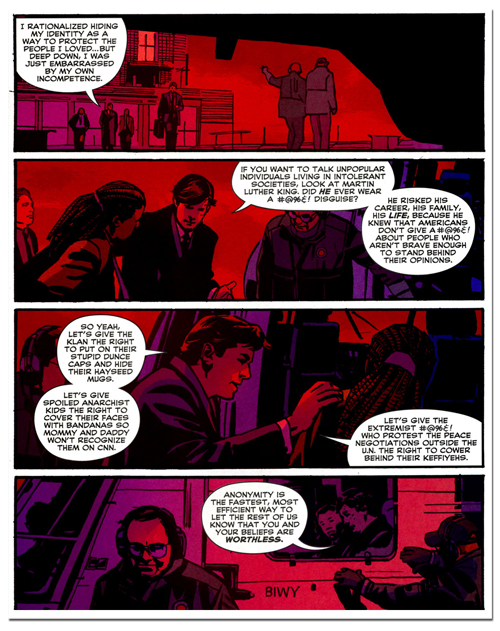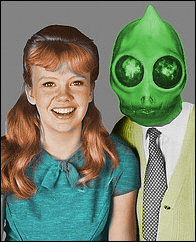In the Ex Machina Special #3 (October 2007), Brian K. Vaughn and the rest of the creative team sum up the advantages and drawbacks of anonymity when fighting for a cause, even when the goal is inimical or positive. In the special, Mayor Hundred declines to forbid a racist rally, opting instead to promote a tolerance rally elsewhere in the city. He reasons that the hate group has a right to stage their rally and the tolerance group has the same right to do likewise, even though they will both probably choose to hide their faces for various reasons.
Click the images to make a talking point
While Vaughn has Mayor Hundred make a valuable argument about Martin Luther King and has the character of Hundred take a personal stand, I don't agree with his sentiment fully and find it a bit dismissive in reality. Anonymity can be an important tool beyond the artificial courage it confers upon internet trolls attacking a feminist blog or skeptic forum. The anonymity his many pseudonyms afforded Benjamin Franklin allowed him to communicate in ways that otherwise would have created nearly insurmountable obstacles for him and the cause of liberty during a period of political and societal unrest in young America.
Often in history (and even today, see the ridiculous O'Reilly vs. DailyKos debacle for example) the small group that claims to be a majority and pretends to represent the beliefs and values of very nearly everyone but in reality does not, nevertheless holds an inordinate amount of power and influence due to connections and access to people through media. As we are all aware from events over the past seven years, telling a lie enough times with enough authority behind it has the result in the majority believing it to be fact. Any publicly known figure who dared to raise their voice in opposition, right or wrong, has been effectively destroyed.
Expanding the concept beyond Vaughn's discourse in the comic book, many bloggers and pundits of today prefer to remain officially unknown and have their identities remain off the record to the world at large. When the primary tactic against a differing opinion is personal attacks and misinformation, anonymity is not only their right but a necessary protection given the mighty forces the faux-majority can wield against a person or organization of limited resources. Even positive blogging about an event, situation, lifestyle, public person or company has resulted in someone losing employment, being attacked or missing opportunities.
It doesn't matter what mask the truth wears, it is still the truth underneath. The mask merely allows the facts to be told without worrying about getting tires slashed or livelihood threatened.
Tags: Free Speech





























Martin Luther King Jr. did a lot of good against great opposition, and he did it without a mask or pseudonym. Of course, he was killed for what he did.
ReplyDeleteWe thank you, sir.
ReplyDelete(no, I'm not a KKK's spokesperson)
I had sort of the opposite response to this issue, which is that he made a persuasive point.
ReplyDeleteI think of a lot of us would agree that anonymity can be good and necessary. In fact, I think that's almost a cultural given how widely anonymous speakers are accepted. In the court of law, minors and sometimes female victims get the benefit of it, as do certain witnesses. I obviously see a point to it since I use it, though my identity is fairly easy to uncover if you try.
Vaughan makes the less accepted argument here. And I don't think the point is so much to say that we shouldn't operate in anonymity but to pull us back from its overuse.
One of the most misunderstood fallacies and arguments is the character of the person persuading. It does matter, especially when that character is part of the argument, as in trust me, I'm an expert.
Along those lines, one thing we lose in anonymity is a potentially powerful point--our intention. When you are anonymous, the intent becomes muddy, if not hidden itself. When we talk about a "report" on global warming or WMDs, why shouldn't we know and even discuss those who created it. Clearly, the White House hasn't wanted that when its staff edits reports.
Unlike 200 years ago, I think being anonymous is actually easier than it used to be, even though our online and electronic comments still leave traces. I bet our generation has left far more anonymous comments than our parents.
The point is that I think being open with our identities, we might actually be more powerful. Too often, we (including myself) use anonymity out of fear. And I think that's Vaughan's theme throughout this book, about confronting fears.